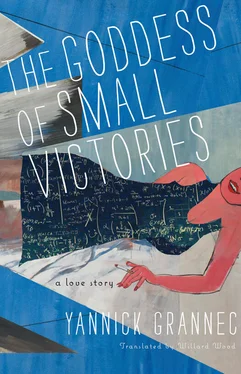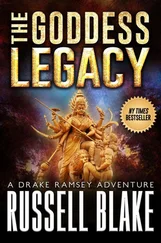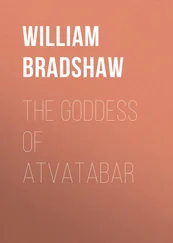“We do make certain assumptions. Just as the Americans make assumptions about us. But you and I share a sense of pessimism. You dread the ambience, and I the turkey.”
“Don’t worry. The cook has her own ideas about Thanksgiving. Our hostess tries to make her respect the traditions, but Ernestine can’t help herself, she always adds an exotic touch. I remember once a very spicy stuffing. All the guests were teary-eyed.”
She preferred not to mention the Thanksgiving when Leo had added a highly unusual substance to the stuffing. The “Space Turkey,” as he later dubbed it, had led to a memorable end of the day, with the survivors rambling on endlessly while sprawled across the couches. Anna had learned a lot that afternoon about the big bang. This practical joke had earned Leonard a one-way ticket to boarding school.
The table was magnificently set: silverware in battle formation, sparkling crystal, elaborate floral arrangements, steaming platters of food. Anna recognized the white dinnerware with its pattern of silver ferns that she had loved as a child, when she used to trace the plants’ circumvolutions with her finger to escape the endless adult discussions. Now she was on the other side of the bridge. She caressed the motifs on her plate. She thought of the Gödels back when, fresh off the boat, they had first encountered these mountains of food. Adele had gorged herself, Kurt had nibbled at the poultry.
Ernestine appeared holding an enormous golden fowl, which she deposited on a sideboard, and picked up a knife scaled to the proportions of the beast. The guests watched this battle of titans in silence. The monster would get the worst of it; Ernestine was a force of nature. She brandished her weapon over the dinner table: “A Thanksgiving turkey cooked my way !” Virginia sent distress signals to her husband, who reassured her with a contrite smile. Detecting the scent of truffles, Pierre Sicozzi beamed. Ernestine, delighted to have hit her mark, brought him the first serving. When she came to Anna with a scarily huge slice of turkey and an outsized mound of stuffing, the young woman almost fainted. But there was no doubt in her mind that she had every interest in leaving her plate clean. Ernestine served all the guests with similar generosity, except Virginia, to whom she gave a microscopic portion and a knowing smile. “Worse luck, to be dieting on Thanksgiving.” Virginia favored her guests with a convincing frown of dismay. Professor Sicozzi, smiling from ear to ear, seemed to be enjoying the show.
The guests passed the serving plates from hand to hand: mashed potatoes and sweet-potato puree, fluorescent green string beans, golden corn and rolls. Leonard scribbled notes on an ink-stained notepad, completely ignoring his plate and his tablemates. Pierre Sicozzi, for his part, displayed an appetite disproportionate to his spare physique.
“You must enjoy sports.”
“I walk a great deal in all weathers. I can’t think otherwise.”
Ernestine held out the wine bottle for him to inspect: Gevrey-Chambertin, 1969. A little light to pair with truffles, but he said nothing. The Frenchman rolled the wine around in his mouth attentively. The charmer had Tine securely in his pocket. She left with a dancing step, making the gaudy colors on her vast hips sway. Leonard guzzled the nectar as if it were soda. Pierre Sicozzi observed him with a small smile.
“You seem preoccupied, Leonard.”
“I had an idea. I didn’t want to forget it.”
“You’re quite right. Some comets pass only once. The best hypotheses don’t come to you sitting at a desk. Intuition, a faculty common to all, must be allowed to speak, but most people repress it. 45It’s all in knowing how to shut the left brain down to let the right brain wander.”
“You’re talking about the recent writings of Roger Wolcott Sperry on hemispheric specialization?” 46
Anna, relieved of carrying the conversation, wondered if she’d regret the inconsequence of her first gambits. Sicozzi and Leonard belonged to the same species. She was prepared for them to talk shop across her plate without any regard for her.
“I often count on my right lobe, the intuitive brain, to solve a problem for me. You work on theoretical computer science, if I’m not mistaken.”
“Cryptanalysis, actually.”
“Your father told me about your research in encryption. You’ve moved away from his own fields of interest.”
“He likes to tell me that he puts my chosen field somewhere between plumbing and automobile repair.” 47
Anna decided not to correct this unfair allegation. Calvin Adams always spoke of Leo with undisguised pride. The father had never ventured more than a little irony to squelch his son, who in return savaged his father unmercifully. While Calvin worried that his brilliant son might be wasting his talents on overly “technical” studies, Leo accused him outright of hiding his intellectual barrenness by copping an administrative post. The elder Adams had been an inspired mathematician before accepting the honor and material comfort of his present chronophagic job.
“Calvin described it enthusiastically enough to me.”
Leo, flattered by the Frenchman’s attention, grew loquacious. With two friends, he had been working on a new system for encrypting computer data. He spoke of an “asymmetric encryption” that would allow the exchange of digital information to remain confidential. Although this business of “public key cryptography” was totally obscure to her, Anna listened hungrily. In other circumstances, Leo would never take the trouble to tell her about his research. How many times when they were children had he not grown furious explaining ideas that to him were perfectly clear? Recognizing in his interlocutor the bewildered expression he had so often mocked in Anna, Leo grabbed his notepad to scratch out a quick sketch.
“Imagine a simple lock. Anyone can close it. But only you can open it, as long as you have the key. The combination.”
She thought of her locker at school. At the time, Leo used it for ancillary storage: old socks and controlled substances. No matter how often she changed the combination, he always managed to crack it, showing early signs of his calling.
“Encrypting, or locking, is easy. Anyone can do it. Decryption, or opening the lock, can be done only by the person holding the key. Knowing how to close the lock doesn’t give you any information about how to open it.”
Anna signaled her full attention by laying down her knife and fork.
“Imagine that you send your locker, with the lock unlocked, and that you keep the key.”
She visualized a long line of eighteen-wheelers loaded with lockers traveling across the country in a modern version of the Pony Express. She decided not to share the image with Leo. His humor was not particularly bijective: his touchiness was matched only by his ability to trample on the sensibilities of others.
“I put a message in the box. I lock your padlock. For me, this is an irreversible act. But you will be able to unlock the box when you receive it and retrieve the contents.”
Pierre Sicozzi was scanning the table for a bottle of wine. At the far end, the three graduate students were pouring out the last of the Gevrey-Chambertin. Ernestine, not missing a trick, uncorked a new bottle for Pierre.
“You would need to identify one-way functions that answered the requirements of this asymmetric key. Mathematical operations that are simple but very difficult to reverse.”
Leonard gave a tight-lipped smile, which for him was a sign of rapturous delight.
“Done.” 48
“Splendid! Where did the inspiration come from?”
“From pizza. I consume hallucinogenic quantities of it. But to be entirely factual, the idea came to my colleague after a night of drinking.”
Читать дальше












